Brexit 英国脱欧
英国脱欧的影响

英国脱欧的影响1. 引言英国脱欧(Brexit)是指英国于2016年6月23日举行的全民公投中,以51.9%的票数决定脱离欧盟。
这一决定将对英国和欧洲乃至全球产生深远的影响。
本文将探讨英国脱欧的影响,并分析对经济、政治和社会等方面的影响。
2. 英国经济的影响2.1. 贸易关系的变化英国脱欧将导致英国与欧盟的贸易关系发生巨大变化。
英国脱欧后,将不再享受欧盟内部市场的自由贸易优惠,将需要与欧盟重新谈判贸易协议。
这将可能导致英国与欧盟之间的贸易壁垒增加,影响英国出口和进口。
同时,英国脱欧还将对英国与其他国家的贸易关系产生影响,可能需要重新谈判与其他国家的贸易协议。
2.2. 投资和金融市场的动荡英国脱欧引发了金融市场的动荡。
在公投结果公布后,英国股市出现大幅下跌,英镑汇率大幅下降。
不确定性和市场风险的增加,可能导致投资者对英国市场和英国资产的回避。
这将对英国的金融市场和投资环境造成不利影响,可能导致投资额的减少和资本外流。
2.3. 跨国公司和就业市场英国脱欧对于跨国公司和就业市场也将产生影响。
许多跨国公司将重新评估其在英国的业务布局和投资计划。
一些公司可能会选择将总部和部分业务迁离英国,以避免脱欧对其业务造成的不确定性和风险。
这将对英国的就业市场产生影响,可能导致失业率上升和工资增长放缓。
3. 英国政治的影响3.1. 内部政治动荡英国脱欧将对英国政治产生巨大影响。
脱欧公投导致英国保守党出现党内分裂,首相辞职,新一届首相上台后面临大量脱欧相关政策的制定和实施。
英国脱欧还加剧了苏格兰独立的呼声,苏格兰可能会举行独立公投,并重新申请加入欧盟。
3.2. 欧洲政治格局的变化英国脱欧对欧洲政治格局也将产生影响。
英国是欧盟的重要成员国之一,其脱欧将导致欧盟在政治和经济方面的力量重新分配。
欧洲一体化进程可能面临更大的挑战,其他国家也可能会效仿英国脱欧,对欧洲联盟形成冲击。
4. 英国社会的影响4.1. 移民政策和多元文化英国脱欧将对英国的移民政策和多元文化产生影响。
英国脱欧:采购商需积极应对市场变化
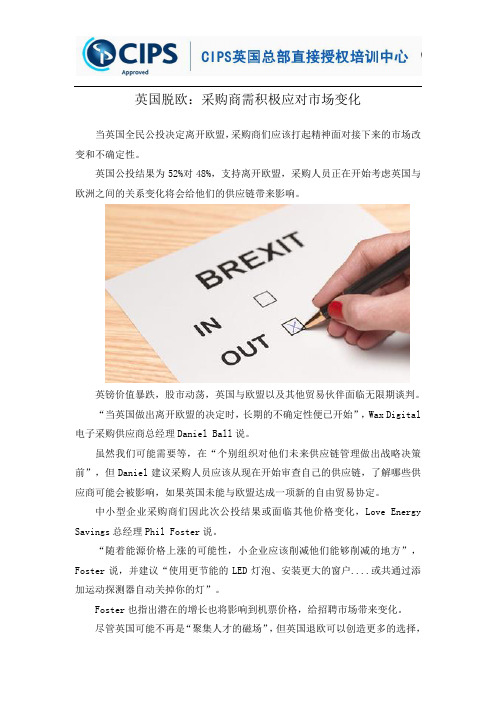
英国脱欧:采购商需积极应对市场变化当英国全民公投决定离开欧盟,采购商们应该打起精神面对接下来的市场改变和不确定性。
英国公投结果为52%对48%,支持离开欧盟,采购人员正在开始考虑英国与欧洲之间的关系变化将会给他们的供应链带来影响。
英镑价值暴跌,股市动荡,英国与欧盟以及其他贸易伙伴面临无限期谈判。
“当英国做出离开欧盟的决定时,长期的不确定性便已开始”,Wax Digital 电子采购供应商总经理Daniel Ball说。
虽然我们可能需要等,在“个别组织对他们未来供应链管理做出战略决策前”,但Daniel建议采购人员应该从现在开始审查自己的供应链,了解哪些供应商可能会被影响,如果英国未能与欧盟达成一项新的自由贸易协定。
中小型企业采购商们因此次公投结果或面临其他价格变化,Love Energy Savings总经理Phil Foster说。
“随着能源价格上涨的可能性,小企业应该削减他们能够削减的地方”,Foster说,并建议“使用更节能的LED灯泡、安装更大的窗户....或共通过添加运动探测器自动关掉你的灯”。
Foster也指出潜在的增长也将影响到机票价格,给招聘市场带来变化。
尽管英国可能不再是“聚集人才的磁场”,但英国退欧可以创造更多的选择,从非欧盟国家中,如印度和中国招募。
“这对于那些在科学、技术、工程和数学方面的人才来说是个好消息”,Foster说道。
其他人对当下的买家并不太关心。
“英国立即离开欧盟国际协定看上去是不太可能的”,Milan Panchmatia 说道,4C Associates咨询服务公司的执行合伙人,他补充说“进口管理....将会变得更加复杂”。
“目前的消息是‘照常营业,直到另行告知’,”Bevan Brittan律师事务所采购负责人Emily Heard说。
Brittany还说,许多欧盟的采购规则,包括那些平等的待遇、非歧视、透明度和比例“已实施的国家立法和法规仍具有约束力,除非直到议会撤销它们”。
BRETXIT_英国脱欧
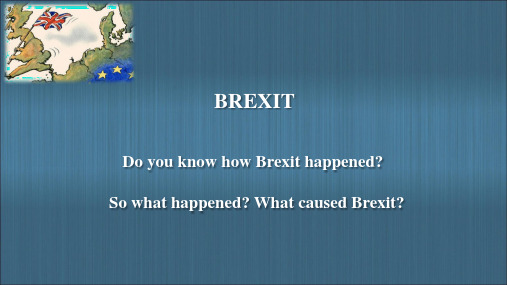
N0.3
Mutual Suspicion Ferment Quickly
Quickly Ferment——Mutual Suspicion
Under the previous context,Britain's Conservative Party began to doubt the EU policy had a negative impact rather than positive,trends in some future's policy may also harm to the Britain.At same time,the spread of the European debt crisis had not only accelerated the spread of suspicion of Europe,but also speeded up the step of Brexit. In contrast, others of the EU had became increasingly dissatisfied with Britain's "unreliable",thinking Britain as a member of the EU, played a negative role in integrating into the EU (for it not only opposed Euro, did not participate in the meeting, not address the crisis in EU, but also opposed all financial regulatory policies). Trust between the two sides had slided to the lowest point right away.
英国“脱欧”法案及其进程
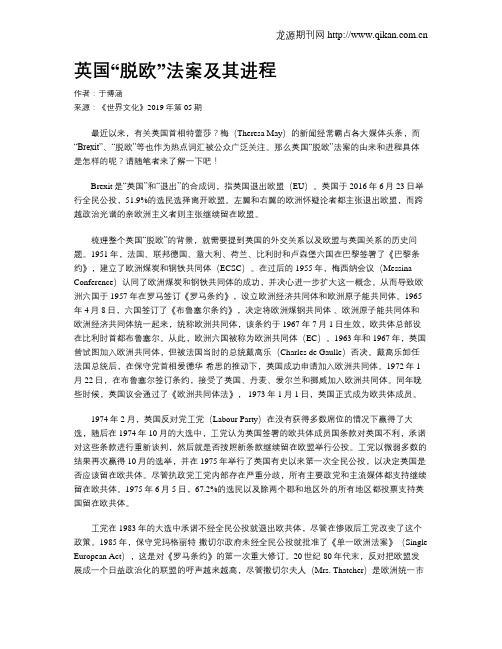
英国“脱欧”法案及其进程作者:于博涵来源:《世界文化》2019年第05期最近以来,有关英国首相特蕾莎?梅(Theresa May)的新闻经常霸占各大媒体头条,而“Brexit”、“脱欧”等也作为热点词汇被公众广泛关注。
那么英国“脱欧”法案的由来和进程具体是怎样的呢?请随笔者来了解一下吧!Brexit是“英国”和“退出”的合成词,指英国退出欧盟(EU)。
英国于2016年6月23日举行全民公投,51.9%的选民选择离开欧盟。
左翼和右翼的欧洲怀疑论者都主张退出欧盟,而跨越政治光谱的亲欧洲主义者则主张继续留在欧盟。
梳理整个英国“脱欧”的背景,就需要提到英国的外交关系以及欧盟与英国关系的历史问题。
1951年,法国、联邦德国、意大利、荷兰、比利时和卢森堡六国在巴黎签署了《巴黎条约》,建立了欧洲煤炭和钢铁共同体(ECSC)。
在过后的1955年,梅西纳会议(Messina Conference)认同了欧洲煤炭和钢铁共同体的成功,并决心进一步扩大这一概念。
从而导致欧洲六国于1957年在罗马签订《罗马条约》,设立欧洲经济共同体和欧洲原子能共同体。
1965年4月8日,六国签订了《布鲁塞尔条约》,决定将欧洲煤钢共同体、欧洲原子能共同体和欧洲经济共同体统一起来,统称欧洲共同体,该条约于1967年7月1日生效,欧共体总部设在比利时首都布鲁塞尔。
从此,欧洲六国被称为欧洲共同体(EC)。
1963年和1967年,英国曾试图加入欧洲共同体,但被法国当时的总统戴高乐(Charles de Gaulle)否决。
戴高乐卸任法国总统后,在保守党首相爱德华·希思的推动下,英国成功申请加入欧洲共同体。
1972年1月22日,在布鲁塞尔签订条约,接受了英国、丹麦、爱尔兰和挪威加入欧洲共同体。
同年晚些时候,英国议会通过了《欧洲共同体法》, 1973年1月1日,英国正式成为欧共体成员。
1974年2月,英国反对党工党(Labour Party)在没有获得多数席位的情况下赢得了大选,随后在1974年10月的大选中,工党认为英国签署的欧共体成员国条款对英国不利,承诺对这些条款进行重新谈判,然后就是否按照新条款继续留在欧盟举行公投。
英语历史文献翻译50题
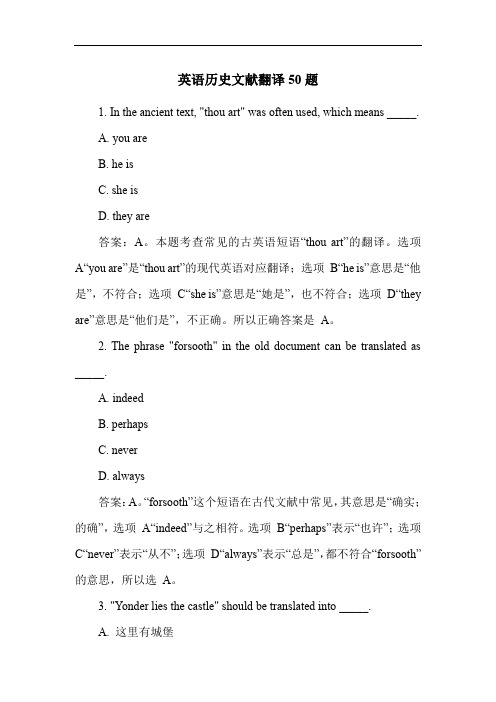
英语历史文献翻译50题1. In the ancient text, "thou art" was often used, which means _____.A. you areB. he isC. she isD. they are答案:A。
本题考查常见的古英语短语“thou art”的翻译。
选项A“you are”是“thou art”的现代英语对应翻译;选项B“he is”意思是“他是”,不符合;选项C“she is”意思是“她是”,也不符合;选项D“they are”意思是“他们是”,不正确。
所以正确答案是A。
2. The phrase "forsooth" in the old document can be translated as _____.A. indeedB. perhapsC. neverD. always答案:A。
“forsooth”这个短语在古代文献中常见,其意思是“确实;的确”,选项A“indeed”与之相符。
选项B“perhaps”表示“也许”;选项C“never”表示“从不”;选项D“always”表示“总是”,都不符合“forsooth”的意思,所以选A。
3. "Yonder lies the castle" should be translated into _____.A. 这里有城堡B. 那里有城堡C. 远处有城堡D. 旁边有城堡答案:B。
“yonder”意思是“那里;那边”,所以“Yonder lies the castle”应翻译为“那里有城堡”,选项B 正确。
选项 A 中“这里”对应的英语是“here”;选项C“远处”常用“far away”等表达;选项D“旁边”常用“beside”等词,均不符合题意。
4. The word "anon" in the historical text could mean _____.A. soonB. lateC. neverD. often答案:A。
流行英语热词

流行英语热词近年来,由于全球化的发展和互联网的普及,流行英语热词在我们的日常生活中越来越普遍。
这些热词不仅仅是用来表达意思,更是一种文化现象的体现。
在本文中,我们将介绍一些流行英语热词,并解释它们的含义及应用场景。
一、热词一:"Selfie""Selfie" 是指拍摄自拍照片的行为,它来自于“自拍”(self-portrait)这个词汇的缩写。
这个词汇首次出现在社交媒体上,如Facebook和Instagram等。
如今,自拍已经成为一种流行的社交互动方式,人们可以通过自拍照片展示自己的生活和个性。
二、热词二: "FOMO""FOMO" 是 "Fear of Missing Out" 的缩写,中文意思是 "错失恐惧症"。
这个热词形容了人们害怕错过任何新鲜事物或重要事件的心态。
当人们看到其他人在社交媒体上分享各种精彩瞬间时,他们可能会感到焦虑和不安。
这种焦虑来自于对于错过重要时刻的恐惧。
三、热词三:"Ghosting""Ghosting" 是指在没有任何解释或说明的情况下突然停止与某人的联系,无论是通过短信、电话或社交媒体。
这个热词最初是用来形容在恋爱关系中主动中断联系的行为,但现在它也可以用于形容其他关系,如友谊或工作关系。
四、热词四:"Influencer""Influencer" 是指在社交媒体上拥有大量关注者和影响力的人。
这些人通常通过分享自己的生活、经验和意见来影响粉丝的购买决策和品味。
许多品牌会与这些影响者合作,以便利用他们的影响力来推广产品和服务。
五、热词五:"Brexit""Brexit" 是指英国脱欧(Britain Exit European Union)的事件。
脱欧对英国经济和金融市场的影响评估

脱欧对英国经济和金融市场的影响评估脱欧(Brexit)是指英国决定退出欧洲联盟(EU)的过程及其造成的影响。
自2016年英国公投决定脱欧以来,脱欧议题一直备受关注,对英国经济和金融市场造成了深远的影响。
本文将对脱欧对英国经济和金融市场的影响进行综合评估。
首先,脱欧对英国经济造成的不确定性极大地影响了投资和商业活动。
脱欧谈判以及对未来英欧贸易关系的预期,使得许多企业延迟了投资决策。
这种不确定性导致了经济增长放缓,投资减少,并且严重影响了企业和消费者的信心。
许多国际公司甚至决定将投资或总部迁至其他欧洲国家,以避免未知的贸易和市场访问壁垒。
其次,脱欧对英国的贸易关系产生了深远的影响。
作为欧盟成员国,英国享受了与其他欧洲国家实行零关税和无限制贸易的优势。
但是,脱欧后,英国将面临重新谈判贸易协定的挑战,并且需要重新确定与欧盟以及其他重要国际贸易伙伴的贸易关系。
这些谈判过程可能很漫长且复杂,会给英国经济带来不利的贸易条件,限制进出口和市场准入。
第三,脱欧对英国金融市场带来了一定的冲击。
伦敦作为欧洲金融中心,受到了脱欧决策的巨大影响。
一些金融机构和基金管理公司已经将业务转移到其他欧洲城市,这导致了英国金融行业的就业和市场份额的下降。
随着脱欧谈判进展的不确定性,金融市场的波动性增加,投资者对英国金融市场的信心受到影响。
同时,英国失去了欧洲中央银行的监管和监督的优势,可能会面临金融安全和稳定方面的挑战。
然而,脱欧也带来了一些潜在的机会和变革。
脱欧使得英国能够自主决定和管理自己的经济政策,包括贸易政策和监管框架。
这为英国提供了制定更加灵活和切合实际的政策的机会,以推动经济增长和创新。
脱欧还可能促使英国寻求与其他国家和地区建立更加广泛和深入的贸易合作关系,进一步扩大市场准入和经济机会。
在评估脱欧对英国经济和金融市场的影响时,我们也必须考虑到其他因素的影响。
全球经济增长放缓、国际贸易紧张局势以及新冠疫情等因素,都对英国经济和金融市场产生了不可忽视的影响。
英国脱欧是什么意思啊

英国脱欧是什么意思啊英国脱欧(英文:Brexit)指的是英国脱离欧洲联盟(European Union,简称EU)的过程和结果。
这一事件是近年来国际政治经济领域中备受关注的热门话题之一,对英国、欧洲乃至全球产生了深远影响。
脱欧的背景英国加入欧盟的历史可以追溯到1973年。
然而,自欧洲一体化进程加速以来,英国与欧盟之间一直存在诸多矛盾和分歧。
一方面,英国政府和部分英国民众对欧洲一体化持怀疑态度,担心自主权受损和移民增加带来负面影响;另一方面,欧盟的部分政策和规定在英国引发了争议,使得不少英国民众对欧盟持批评态度。
在2016年6月23日举行的英国脱欧公投中,51.9%的选民选择支持离开欧盟,48.1%的选民选择留在欧盟。
这一结果意味着英国开始了正式脱欧的进程。
脱欧的意义国家主权英国脱欧被许多支持者视为恢复国家主权的体现。
英国脱离欧盟后,将不再受制于欧盟的法律和政策,重新获得国家自主权。
支持者认为,这将使得英国能够更加自主地制定适合自身国家利益的政策和法规。
移民政策移民政策是支持脱欧的一个重要因素。
英国脱欧意味着该国将能够控制自身的移民政策,减少或限制移民进入的数量和条件。
这一举措旨在降低移民对英国社会、经济和公共服务所带来的压力。
贸易和经济英国脱欧对贸易和经济领域产生了深远影响。
脱欧之后,英国将不再受制于欧盟的贸易政策和规定,有更大的自由去与其他国家和地区达成独立贸易协定。
然而,脱欧也带来了一定程度的不确定性,对英国与欧盟之间的贸易关系和经济合作造成了冲击。
欧洲一体化英国脱欧被认为是欧洲一体化进程中的一个重要转折点。
脱欧事件引发了欧盟内部的一系列变革和讨论,对欧洲一体化进程带来一定影响。
此外,英国脱欧还可能影响其他国家和地区对欧盟的看法和态度,鼓舞了一些国家和地区提出类似退欧的要求或加强对欧盟与自身关系的审视。
脱欧后的进程和影响英国脱欧的进程相当复杂,涉及到双方的协商和约定。
在2019年1月,英国正式启动了脱欧进程,开始与欧盟展开谈判。
大学生英语新闻笔记摘抄(3篇)
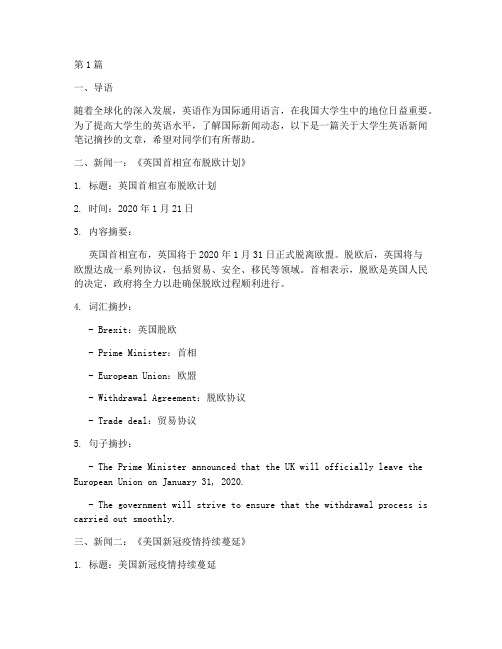
第1篇一、导语随着全球化的深入发展,英语作为国际通用语言,在我国大学生中的地位日益重要。
为了提高大学生的英语水平,了解国际新闻动态,以下是一篇关于大学生英语新闻笔记摘抄的文章,希望对同学们有所帮助。
二、新闻一:《英国首相宣布脱欧计划》1. 标题:英国首相宣布脱欧计划2. 时间:2020年1月21日3. 内容摘要:英国首相宣布,英国将于2020年1月31日正式脱离欧盟。
脱欧后,英国将与欧盟达成一系列协议,包括贸易、安全、移民等领域。
首相表示,脱欧是英国人民的决定,政府将全力以赴确保脱欧过程顺利进行。
4. 词汇摘抄:- Brexit:英国脱欧- Prime Minister:首相- European Union:欧盟- Withdrawal Agreement:脱欧协议- Trade deal:贸易协议5. 句子摘抄:- The Prime Minister announced that the UK will officially leave the European Union on January 31, 2020.- The government will strive to ensure that the withdrawal process is carried out smoothly.三、新闻二:《美国新冠疫情持续蔓延》1. 标题:美国新冠疫情持续蔓延2. 时间:2020年3月14日3. 内容摘要:美国新冠疫情持续蔓延,确诊病例已超过10万。
政府宣布进入国家紧急状态,各地实施封锁措施,以遏制疫情扩散。
同时,美国政府积极寻求国际合作,共同应对疫情挑战。
4. 词汇摘抄:- COVID-19:新冠病毒- Pandemic:大流行- Emergency declaration:国家紧急状态- Lockdown:封锁- International cooperation:国际合作5. 句子摘抄:- The number of confirmed cases in the United States has exceeded 100,000.- The government has declared a national emergency and implemented lockdown measures to contain the spread of the virus.- The United States is actively seeking international cooperation to combat the pandemic.四、新闻三:《巴西总统感染新冠病毒》1. 标题:巴西总统感染新冠病毒2. 时间:2020年3月27日3. 内容摘要:巴西总统感染新冠病毒,成为全球首位确诊的总统。
英国脱欧英文作文
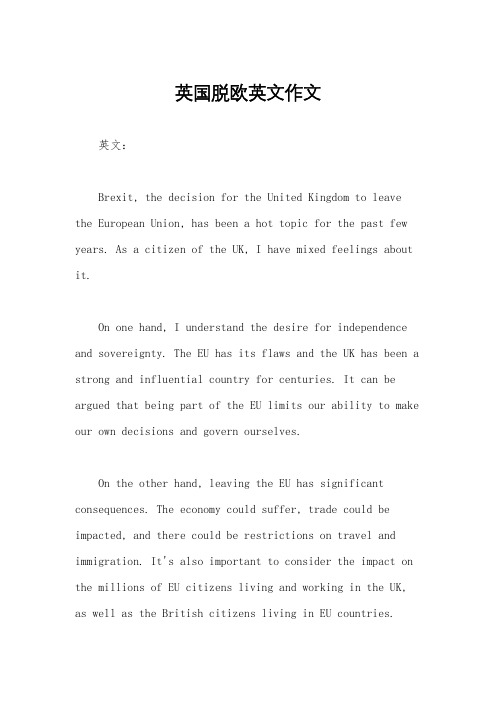
英国脱欧英文作文英文:Brexit, the decision for the United Kingdom to leave the European Union, has been a hot topic for the past few years. As a citizen of the UK, I have mixed feelings about it.On one hand, I understand the desire for independence and sovereignty. The EU has its flaws and the UK has been a strong and influential country for centuries. It can be argued that being part of the EU limits our ability to make our own decisions and govern ourselves.On the other hand, leaving the EU has significant consequences. The economy could suffer, trade could be impacted, and there could be restrictions on travel and immigration. It's also important to consider the impact on the millions of EU citizens living and working in the UK, as well as the British citizens living in EU countries.Personally, I believe that the decision to leave the EU was made too hastily and without enough consideration for the potential consequences. It's a complex issue with no easy answers, and I think it's important for the government to approach it with caution and care.中文:英国脱欧,即英国决定退出欧盟,成为过去几年的热门话题。
英国脱欧英文作文
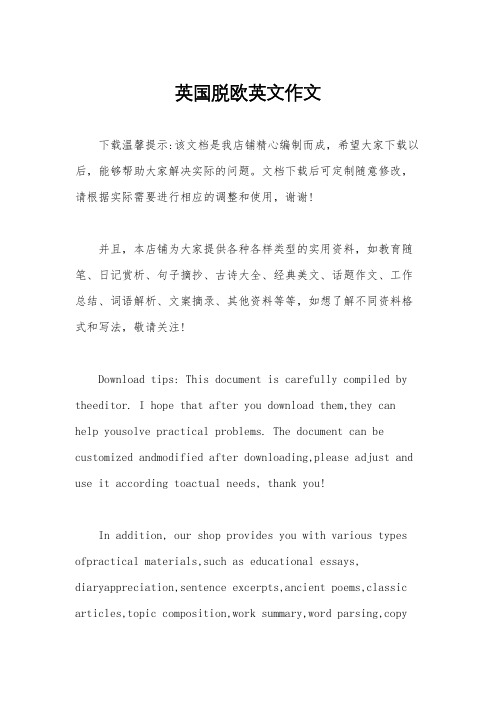
英国脱欧英文作文下载温馨提示:该文档是我店铺精心编制而成,希望大家下载以后,能够帮助大家解决实际的问题。
文档下载后可定制随意修改,请根据实际需要进行相应的调整和使用,谢谢!并且,本店铺为大家提供各种各样类型的实用资料,如教育随笔、日记赏析、句子摘抄、古诗大全、经典美文、话题作文、工作总结、词语解析、文案摘录、其他资料等等,如想了解不同资料格式和写法,敬请关注!Download tips: This document is carefully compiled by theeditor. I hope that after you download them,they can help yousolve practical problems. The document can be customized andmodified after downloading,please adjust and use it according toactual needs, thank you!In addition, our shop provides you with various types ofpractical materials,such as educational essays, diaryappreciation,sentence excerpts,ancient poems,classic articles,topic composition,work summary,word parsing,copyexcerpts,other materials and so on,want to know different data formats andwriting methods,please pay attention!Brexit has been a hot topic in the UK for years now. Many people are still divided on whether it was the right decision to leave the EU. Some believe that it will bring more opportunities for the country, while others worry about the potential negative consequences.One of the main reasons for Brexit was to regaincontrol over immigration. Many Brits felt that the EU's open borders policy was putting a strain on public services and job opportunities. By leaving the EU, the UK can now implement its own immigration policies and control who enters the country.On the other hand, there are concerns about the economic impact of Brexit. The UK's economy has already taken a hit since the referendum in 2016, with businesses uncertain about the future. Trade agreements with other countries will need to be renegotiated, which could take years to finalize.Despite the uncertainties surrounding Brexit, the UK government is determined to make it a success. They have been working hard to secure trade deals with other countries and ensure a smooth transition out of the EU. Only time will tell if Brexit will be beneficial for the UK in the long run.In conclusion, Brexit has been a divisive issue in the UK, with strong arguments on both sides. While some believe it will bring more opportunities for the country, others are concerned about the potential negative consequences. Only time will tell what the future holds for the UK post-Brexit.。
英国为什么要退出欧盟的原因
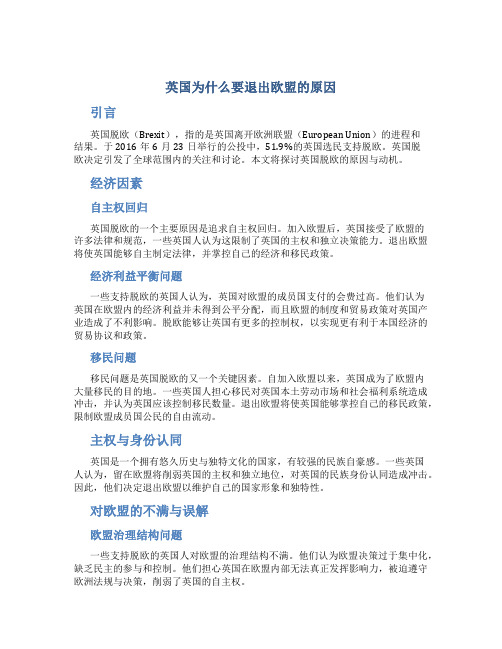
英国为什么要退出欧盟的原因引言英国脱欧(Brexit),指的是英国离开欧洲联盟(European Union)的进程和结果。
于2016年6月23日举行的公投中,51.9%的英国选民支持脱欧。
英国脱欧决定引发了全球范围内的关注和讨论。
本文将探讨英国脱欧的原因与动机。
经济因素自主权回归英国脱欧的一个主要原因是追求自主权回归。
加入欧盟后,英国接受了欧盟的许多法律和规范,一些英国人认为这限制了英国的主权和独立决策能力。
退出欧盟将使英国能够自主制定法律,并掌控自己的经济和移民政策。
经济利益平衡问题一些支持脱欧的英国人认为,英国对欧盟的成员国支付的会费过高。
他们认为英国在欧盟内的经济利益并未得到公平分配,而且欧盟的制度和贸易政策对英国产业造成了不利影响。
脱欧能够让英国有更多的控制权,以实现更有利于本国经济的贸易协议和政策。
移民问题移民问题是英国脱欧的又一个关键因素。
自加入欧盟以来,英国成为了欧盟内大量移民的目的地。
一些英国人担心移民对英国本土劳动市场和社会福利系统造成冲击,并认为英国应该控制移民数量。
退出欧盟将使英国能够掌控自己的移民政策,限制欧盟成员国公民的自由流动。
主权与身份认同英国是一个拥有悠久历史与独特文化的国家,有较强的民族自豪感。
一些英国人认为,留在欧盟将削弱英国的主权和独立地位,对英国的民族身份认同造成冲击。
因此,他们决定退出欧盟以维护自己的国家形象和独特性。
对欧盟的不满与误解欧盟治理结构问题一些支持脱欧的英国人对欧盟的治理结构不满。
他们认为欧盟决策过于集中化,缺乏民主的参与和控制。
他们担心英国在欧盟内部无法真正发挥影响力,被迫遵守欧洲法规与决策,削弱了英国的自主权。
英国与欧洲国家的文化差异英国与欧洲大陆国家有着不同的文化和历史背景。
一些英国人认为,英国的法律制度、教育体系和传统价值观与欧洲国家存在很大差异。
他们担心留在欧盟内会导致英国文化和价值观的被冲淡或忽视。
结论英国退出欧盟的决策是一个复杂的过程,受到多个因素的影响。
英国脱欧英语作文

Brexit,a term coined by merging Britain and exit,refers to the United Kingdoms decision to leave the European Union EU.This historic event,which took place on June 23,2016,through a referendum,has had profound implications for the UK,the EU,and the global economy.The referendum saw51.9%of the voters choosing to leave the EU,while48.1%voted to remain.This decision was driven by a variety of factors,including concerns over immigration,national sovereignty,and the financial contributions the UK made to the EU.One of the primary reasons for Brexit was the issue of immigration.The EUs freedom of movement policy allows citizens of member countries to live and work in any other member state without needing permission.Some British citizens felt that this policy led to an influx of immigrants,putting pressure on public services and job opportunities. Another significant factor was the perceived loss of sovereignty.Critics of the EU argued that the UK was subject to too many regulations and decisions made by the EU that affected its domestic policies.They believed that leaving the EU would allow the UK to regain control over its laws and borders.The financial aspect of the EU membership was also a contentious issue.The UK was one of the largest contributors to the EU budget,which some saw as a burden on the countrys economy.Proponents of Brexit argued that the money could be better spent on domestic needs,such as the National Health Service.The process of leaving the EU,known as the Article50process,was initiated by the UK government in March2017.This started a twoyear countdown for negotiations on the terms of the UKs exit.The negotiations covered a wide range of topics,including trade, the rights of EU citizens living in the UK,and the financial settlement the UK would have to pay to the EU.One of the most challenging aspects of the Brexit negotiations was the issue of the Irish border.The UKs only land border with the EU is between Northern Ireland,which is part of the UK,and the Republic of Ireland,an EU member state.The Good Friday Agreement,which brought peace to the region after decades of conflict,relies on an open border.Finding a solution that respects both the UKs desire for an independent trade policy and the need for an open border has been a complex task.The Brexit process has also had significant political implications within the UK.It led to the resignation of Prime Minister David Cameron,who was a strong advocate for remaining in the EU,and has seen multiple changes in leadership within the ConservativeParty.The issue has also divided the country,with strong opinions on both sides of the debate.The UK officially left the EU on January31,2020,entering a transition period that was initially set to end on December31,2020.During this time,the UK and the EU continued to negotiate their future relationship.The transition period was later extended to allow more time for negotiations,and a trade deal was finally agreed upon in late December 2020.The impact of Brexit on the UK and the EU is still unfolding.Economically,the UK faces the challenge of establishing new trade agreements not only with the EU but also with other countries around the world.Politically,the UK must navigate its new role as an independent nation outside of the EU,while the EU must adapt to the loss of one of its largest and most influential members.In conclusion,Brexit represents a significant shift in the political and economic landscape of both the UK and the EU.The process has been complex and contentious,with farreaching implications for the future of both entities.As the UK continues to forge its path outside of the EU,the full impact of this historic decision will become clearer over time.。
英国脱欧:原因、影响及走向
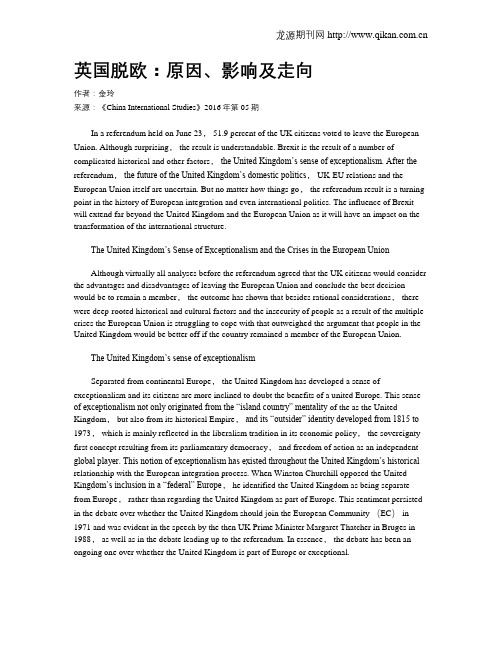
英国脱欧:原因、影响及走向作者:金玲来源:《China International Studies》2016年第05期In a referendum held on June 23, 51.9 percent of the UK citizens voted to leave the European Union. Although surprising, the result is understandable. Brexit is the result of a number of complicated historical and other factors,the United Kingdom’s sense of exceptionalism. After the referendum,the future of the United Kingdom’s domestic politics, UK-EU relations and the European Union itself are uncertain. But no matter how things go, the referendum result is a turning point in the history of European integration and even international politics. The influence of Brexit will extend far beyond the United Kingdom and the European Union as it will have an impact on the transformation of the international structure.The United Kingdom’s Sense of Exceptionalism and the Crises in the European UnionAlthough virtually all analyses before the referendum agreed that the UK citizens would consider the advantages and disadvantages of leaving the European Union and conclude the best decision would be to remain a member, the outcome has shown that besides rational considerations, there were deep-rooted historical and cultural factors and the insecurity of people as a result of the multiple crises the European Union is struggling to cope with that outweighed the argument that people in the United Kingdom would be better off if the country remained a member of the European Union.The United Kingdom’s sense of exceptionalismSeparated from continental Europe, the United Kingdom has developed a sense of exceptionalism and its citizens are more inclined to doubt the benefits of a united Europe. This sense of exceptionalism not only originated from the “island country” mentality of the as the United Kingdom, but also from its historical Empire,and its “outsider” identity developed from 1815 to 1973, which is mainly reflected in the liberalism tradition in its economic policy, the sovereignty-first concept resulting from its parliamentary democracy, and freedom of action as an independent global player. This notion of exceptionalism has existed throughout the United Kingdom’s historical relationship with the European integration process. When Winston Churchill opposed the UnitedKi ngdom’s inclusion in a “federal” Europe, he identified the United Kingdom as being separate from Europe, rather than regarding the United Kingdom as part of Europe. This sentiment persisted in the debate over whether the United Kingdom should join the European Community (EC) in 1971 and was evident in the speech by the then UK Prime Minister Margaret Thatcher in Bruges in 1988, as well as in the debate leading up to the referendum. In essence, the debate has been an ongoing one over whether the United Kingdom is part of Europe or exceptional.In the parliamentary great debate on membership of the European Community, opponents to the United Kingdom joining put forward three main arguments. First, they were opposed to the unnaturally expensive agricultural products that would ensue and the huge related burden the United Kingdom would have to bear due to the protective agricultural policy of the European Community. They strongly advocated the liberalist economic tradition,and safeguarding Britain’s righ t to buy farm products worldwide. Second, they wanted to protect the unique role of the United Kingdom and guarantee it would remain free from the constraints of the European Community. For the European skeptics, the European Community membership did not entail broadened global horizons for the United Kingdom, rather it would mean a narrowing of them. The euroskeptics argued that rather than joining the European Community and being bound by it, the United Kingdom should independently cultivate its relations with developing countries. Third, they argued joining the European Community posed risks to the United Kingdom’s self-governance, and might even damage its sovereignty. The typical objection was that:“A time will come soon, when whatever decision is made by Parliament in a number of spheres, it will be necessary for that decision to be ratified by a Council of Ministers or by a European Commission or by the European Parliament... We are able to decide this issue knowing that our own decision is unaffected by the will or the decision of any body outside.”The core of Thatcher’s Bruges speech highlighted the uniqueness of the United Kingdom in Europe, consistent with the major viewpoints of the Parliamentary great debate in 1971. In terms of the relationship between the United Kingdom and Europe, she stressed the heritage and connection of the British and European cultures,but highlighted her country’s uniqueness. She pointed out that:“Over the centuries we have fought to prevent Europe from falling under the dominance of a single power,” which emphasized the balancing role it had played as an “outsider.” When it came to the fundamental principles of European integration,she said that “willing and active cooperation between independent sovereign states is the best way to build a successful European Community...working more closely together does not require power to be centralized in Brussels or decisions to be taken by an appointed bureaucracy;” “A state-controlled economy is a recipe for low growth;” “Europe should not be protectionist.” She stressed three major principles: principle of intergovernmental cooperation among sovereign states, principle of being practical, and principle of economic liberalism. She opposed a federalized Europe.No r has the United Kingdom’s sense of exceptionalism faded with the “Europeanizing” process. Instead,its policy orientation toward the EU has been the “outsider as insider.” As a member of the European Union, the United Kingdom has promoted its idea of a free market economic policy, led the construction of a single market,and implemented a “selective” exit in policy areas closely related to sovereignty, such as monetary policy and the Schengen visa system. After the outbreak of its debt crisis, the eurozone shifted more power to Brussels in order to strengthen economic governance. As a result,doubts about the European Union originating from people’s sense of exceptionalism in the United Kingdom rose sharply. The EU-related topics dominated domesticpolitics in the United Kingdom, and became the most divisive issue resulting in the referendum becoming part of the political agenda. Those who stood for leave actively advocated regaining control of the United Kingdom from Brussels, especially the power to contro l the United Kingdom’s borders and reduce immigration. They also claimed that a United Kingdom independent of the European Union would have broader space to develop economic and trade ties with emerging countries.The European Union’s legitimacy cr isisSince joining the European Community in 1973, despite the fact that the United Kingdom has always been an “exception” in European integration, its senior officials never discussed the option of leaving for long until the referendum was offered as a way to appease the anti-EU wing of the ruling Conservative Party. In 2010, the British government discussed the possibility of Brexit in a public debate at the highest level for the first time. The European exit debate and the accompanying questionin g of the European Union’s legitimacy eventually led to the referendum result going in favor of the United Kingdom leaving the European Union.In dealing with the debt crisis, the EU institutions gained unprecedented power of intervention in the economic policies of the EU member states, and they have become increasingly involved in the decision-making of member states. The increasing asymmetry between the democratic processes in the EU member states and the power and functions of the EU institutions and the worsening deficit in the European Union’s democratic legitimacy were also important factors triggering Brexit. For example, after the plan to strengthen the economic governance of the European Union entered into force, the European Commission obtained monitoring and evaluation functions in policy areas that traditionally were the preserve of the governments of its member states, and also the power to impose sanctions against countries that violated its rules; the European Semester system promoted closer coordination between the fiscal policies of member states, granting the European Commission rights to recommendation and supervision of the budget of the EU members. The above transfer of power and functions are in conflict with the United Kingdom’s parliamentary democracy and its well-established sense of “exceptionalism.” This is also why Prime Minister David Cameron stressed in a 2013 speech about the UK-EU relationship that:“It is national parliaments, which are, and will remain, the true source of real democratic legitimacy and accountability in the EU.” He pointed out that the debt crisis was the best opportunity to reform the UK-EU relationship, saying:“We should use that opportunity to reshape Britain’s membership of the EU in ways that advan ce our national interest in free trade, open markets and co-operation. I think that means less Europe not more Europe; less cost,less bureaucracy and less regulation.” The poor responses of the European Union to its multiple crises, including the legitimacy crisis, were also a cause for Brexit. The legitimacy of the European Union comes more from its functional role, that is, people think it is the most appropriate institution to meet people’s needs and that it can provide effective service and added value. Functional legitimacy has been the pillar of the “inclusive consensus” of the European Union for a long time. But in recent years, the poor responses of the European Union to its debtcrisis and refugee crisis have seriously damaged the basis for its functional legitimacy. According to a recent Pew poll, it is on the economic and refugee issues that public opinion shows the greatest opposition to the policies of the European Union. On the question of refugees, 98 percent of Greeks, 88 percent of Swedes and 77 percent of Italians have indicated that they do not agree with the official approach of the European Union. Even in the Netherlands, one of the biggest supporters of the European Union, only 31 percent of citizens are now in favor of the European Union. On economic issues, only 6 percent of Greeks, 22 percent of Italians, and 27 percent of the French have expressed their support for the European Union’s approaches to economic problems. These figures suggest that the public believe that the European Union has failed in its responses to issues relating to their immediate interests. The sharp decline of public support in the United Kingdom for continued membership of the European Union is in keeping with the deterioration in the European Union’s refugee an d migrant crisis. From June to October 2015,the UK citizens’ support for staying in the European Union dropped from 61 percent to 52 percent,highlighting the European Union’s legitimacy crisis.Social differentiation in globalization and European integrationSocial inequality and social differentiation in the process of globalization and European integration were also factors in the referendum in favor of Brexit. While globalization and integration have helped to improve overall economic and social development levels, the free flow of trade,labor and capital has also exacerbated economic and social injustice. The fruits of globalization are not evenly distributed among different classes. Technological innovation and financial capital flows tend to benefit the elites as well as market-adapted younger people. But older people who rely on social redistribution stand to lose a lot. This requires the role of the state in social distribution be strengthened to achieve social justice. But the ability of modern states to intervene in social distribution has declined. Cracks between economy and nationalism have contributed to the rise of anti-elitist, anti-establishment extremist political parties, who advocate populism, and call on people to return to the situation of isolated nation states.The United Kingdom also faces serious social differentiation. The wealth gap between its richest 20 percent and the poorest 20 percent is among the worst in the European Union. And, in order to deal with the debt crisis, the Cameron government introduced a series of policy initiatives,including cuts to social welfare and tax policy adjustments, which added to social inequality. As the widening of the wealth gap was even faster than that in the 1980s, it h as accelerated “inequality.” According to research by British economists, by 2015, the average incomes of the poorest families declined by 12 percent,while that of the wealthiest by only by 3 percent. The country’s social differentiation has provided space for extremist political parties to mobilize greater support. In the 2014 European Parliament election, the United Kingdom Independence Party which called for leaving the European Union gained more than 20 percent of the votes. In the referendum,euroskeptics and those who stood for Brexit simply took advantage of the insecurity people felt,promising to control borders, reduce immigration, and protect job opportunities for the UK citizens so as to gain their support.The distribution of votes for “leave” and votes for “remain” has clearly reflected economic and social differentiation against the backdrop of integration. More young voters voted remain, while older voters aged above 55 chose to leave. Scotland and the London area witnessed more votes for remain. More educated and professional people chose to remain. Those who did not have passports and with low incomes tended to choose leave. Leave supporters were inclined to think that the UK economy was at a standstill, and that the entrance of immi grants had “robbed” people of their jobs.Multiple Influences of BrexitBrexit is a major event with historic significance in international politics, which will exert multiple influences on the United Kingdom, the European Union as well as the international political landscape. In the short term, Brexit has triggered British domestic political changes, led to strong volatility in international financial markets, and increased the uncertainty of global economic recovery. However, the shock of Brexit will be long-term, particularly for the development of the EU’s integration in the future as well as the trend of the international political pattern. These impacts will be more evident with the passage of time.British government in dilemma facing political and social splitsThe referendum result will have the most direct impact on the United Kingdom. While adding to its economic uncertainties for a period to come, it will also increase the fragmentation of domestic politics. The economic, social and regional divisions reflected in the referendum need to be addressed in the long run, which may even affect the unity of the United Kingdom as a sovereign state.The UK economy will face uncertainties for a long time. In addition to the financial market turbulence induced by short-term market risk aversion, depreciation of the pound and a drop in investor confidence caused by the political crisis, the UK economy will face long-term uncertainties. In the next two to three years, the main reason for the uncertainties facing the UK economy will be the unclear arrangements of the UK-EU relationship. The UK economy is deeply integrated with the single market. The EU market accounts for 40 percent of the United Kingdom’s services exports. In 2014, the other 27 EU members accounted for 50 percent of the foreign direct investment in the United Kingdom, and the city of London has been the main beneficiary of the EU single market in financial services. The revised relationship after the United Kingdom leaves the European Union will affect not only trade between the United Kingdom and the European Union, but also the flow of FDI. Lack of investor confidence and a large number of withdrawals will weaken the pound and raise interest rates, which would pose the risk of economic recession. Before the referendum, the International Monetary Fund had warned that Brexit would trigger an economic recession for theUnited Kingdom. The latest Economist report says the United kingdom’s economic recovery will stop, and the growth forecast for 2017 has been lowered from 1.8 percent to -1 percent.Trigger political fragmentation of British political parties. After the referendum, the internal conflicts in the mainstream political parties have intensified, and the extreme right-wing United Kingdom Independence Party has been the biggest beneficiary. Cameron adopted a tougher stance toward the European Union after he took office. In 2010, to deliver his campaign promise, he promoted the “Referendum Lock” le gislation, requiring that any transfer of important power or functions to the European Union should go through a British referendum. Then, in order to bridge the differences in his party and fight against the Independence Party, Cameron was critical of the European Union in an attempt to appease the EU skeptics in his party. He even used to say that “Britain would do fine outside the EU,” which made his words predicting dreadful consequences if Britain left the European Union sound hollow. Therefore, to a certain extent, the victory of the eurosceptics was a victory for the Independence Party. And rather than uniting the Conservative Party it has caused an even more serious split. The referendum also further deteriorated the image of the Labor Party. In recent years, the Labor Party has been experiencing a growing identity crisis and different factions have been competing for power within the party, this has distanced the party from the people, and the referendum has further widened their internal divide. Jeremy Corbyn, the leader of the Labor Party, was accused of poorly mobilizing support for remain. Once the result came out, 12 Shadow Cabinet Ministers announced their resignation, leaving the party paralyzed. The division and paralysis of the Labor Party will further alienate voters, offering more space for the development of extreme and nationalist parties.With the social rifts widening, risks of national secession are on the rise. The referendum has unveiled the regional conflicts within Britain, and highlighted conflicts between social classes and different regions. There were even suggestions that the referendum was a showdown between the elites and grassroots. Although the UK government has promised to take into consideration the concerns of remain supporters in future negotiations, there cannot be a perfect outcome for everyone, and the EU issue will continue to test the unity and solidarity of the United Kingdom. Domestic regional separatist issues will again be on the political agenda, and national unity is going to face challenges. In the referendum, Scotland witnessed overwhelming support for remain. Immediately after the result came out,Scotland’s First Minister Nicola Sturgeon said that it was highly likely the Scottish government would call for a second referendum on full independence,which should be held before the United Kingdom formally leaves the European Union. On June 28,the Scottish Parliament passed a motion on the implications of the EU referendum for Scotland, with a view to seeking a way for it to remain a member of the European Union. If this proves futile,Scotland is bound to hold a second referendum on independence. As Northern Ireland also supported remain in the referendum and the Northern Ireland peace process framework has changed because of Brexit, the Northern Ireland issue is also likely to revive. To address the class and generational conflicts exposed in the referendum will also be a difficult task for the new government. Somereferred to the referendum as “the young generation’s fate determined by the old generation,” and questioned the legitimacy of the referendum. For future negotiations, the British government is in a dilemma how to satisfy the young generation’s need for a big single market with the free movemen t of people,while appeasing the old generation’s fear of immigrants.Directional choices for European integrationBrexit is a historic event in the process of European integration, which will exert a far-reaching influence on the future of European integration. It has seriously weakened the European Union’s hard and soft power, triggered an increase in skepticism about the European Union, changed the intra-EU balance,and intensified the dispute over the direction of the European Union’s de velopment. In the future, if the European Union fails to find an effective path to resolve its legitimacy crisis, seek further integration in a practical way, then its development will fundamentally lose momentum.Brexit will seriously weaken the E uropan Union’s international power and influence. Although the United Kingdom is not a founding member of the European Union, nor has it always been close to the Union, it has played an essential role as one of the three most influential powers in the Union. Now it will be the first country to leave the European Union. In addition to proving that integration is not irreversible, it has also exposed the deep-rooted problems in the European Union’s integration model,aggravated the European Union’s image that it is plagued by “multiple crises,” and severely eroded its soft power. Accounting for 15 percent of the European Union’s economic aggregate and 12.5 percent of its population, the United Kingdom is one of the three most influential countries in the European Union,the second largest contributor to the European Union’s budget,and an important driving force of the single market, with the largest amount of investment stock in the European Union. As a permanent member of the UN Security Council and a NATO member that has a special relationship with the United States, the United Kingdom has also been major promoter of the European Union’s security and defence policies. So along with the great significance it will have on the European Union’s security approach and global influence,the United Kingdom’s leaving will directly harm the European Union’s soft power.Thus the number of euroskeptics and extremist forces within the European Union will further increase. Extremist political parties challenge the basic European consensus and widely doubt Europe. They advocate closing national borders, controling the number of immigrants, trade protectionism, direct democracy, and turning Europe to the order of sovereign states. The victory of Brexit supporters has encouraged the euroskeptics and extremist forces within the European Union. Several hours after the announcement of the UK’s referendum result,France’s National Front, the Netherlands’ Liberal Party,Germany’s Alternative for Germany,Italy’s Northern Leag ue, and Austria’s Liberal Party have all called for similar referendums in their countries. Extreme left-wing or right-wing parties currently hold 1,329 Parliament seats in 25 members of the European Union,and eight of its members are ruled by them. Referendums are viewed as a good way to force the mainstream political parties to adopt their political position.Power imbalances within the European Union will deteriorate. The United Kingdom has always been an important balancer within the EU. It has balanced the protectionist tendencies of Southern European countries represented by France, and the concerns of other member states over the increasingly “dominant” role of Germany. The United Kingdom has also promoted the European Union’s security and de fence policies together with France. After the United Kingdom leaves, the influence of Germany will further increase, and concerns over its dominance will increase. After the United Kingdom’s referendum, German Chancellor Angela Merkel and Foreign Minister Frank-Walter Steinmeier respectively convened meetings for major country coordination in Berlin, which provoked dissatisfaction among the other member states. Moreover, a European Union without the United Kingdom will see weakened the advocacy for economic liberalism, and it remains to be seen whether the United Kingdom will become increasingly conservative.The debates over the future direction of the European Union will become more intense, and it is of vital significance whether people can achieve consensus. In recent years, the European Union has suffered continued crises, which have exposed its systemic defects. Its debt crisis has pushed the European Union to enhance its supranational nature in an “intergovernmental” way, and the refugee crisis has highlighted the limitations of the Schengen system. At present, while the European Union hopes to deal with the crises through further integration,this lacks public support. Germany’s Finance Minister Wolfgang Schäuble says that “In response to a Br exit,we can’t simply demand further integration.”Member states have not reached consensus on the path of integration. France advocates that eurozone countries move in the direction of further federalization, Germany seems to be in favor of intergovernmentalist means, while Central and Eastern European countries tend to take back powers from the European Union. At present, the biggest consensus within the European Union is that it needs reform, though the direction for reform is not clear.Influence on the international landscapeCompared to the negative impact on the United Kingdom’s domestic politics and the European Union, the influence of Brexit on the international landscape will take longer to manifest itself. Its effects will be decided by a series of factors,especially the development of the United Kingdom’s domestic politics,the European Union’s integration choices, as well as how the UK-EU relationship proceeds. But in any case, based on the special UK-US relationship, the European Union’s special international role,as well as the United Kingdom’s special role in the European Union, Brexit will inevitably exert structural influence.Breixt will trigger adjustments in the United States’ policies toward the United Ki ngdom and the European Union. The United Kingdom is the most determined and influential member of the European Union with regard the United States. In many instances, especially with regard free tradeand security, the United Kingdom has made efforts to bring the stance of the European Union close to that of the United States. The United Kingdom’s “outsider as insider” role in the European Union has been a major consideration for various United States administrations to promote British involvement in the in tegration. “Having the United Kingdom in the European Union gives us much greater confidence about the strength of the transatlantic union and is part of the cornerstone of institutions built after World War II that has made the world safer and more prospe rous.” After Brexit, Britain will lose all its decision-making powers in the EU affairs, including free trade agreements, security cooperation, and expansion policy,and this will change the United States’ recognition of the European Union’s international status. In 1962, former US Secretary of State Dean Acheson commented on the United Kingdom remaining outside the European Community. He said:“The attempt to play a separate power role apart from Europe,a role based on a ‘special relationship’ with the US and on being the head of a ‘commonwealth’ which has no political structure, unity, or strength—this role is about played out.” The United Kingdom after Brexit has become far less significant strategically for the United States, and the latter will shift the priority of its EU policy to Germany. The future of transatlantic relations will be mainly determined by how the Germany-led EU will develop. In the future, two questions will test the direction of the transatlantic relationship: First, will the European Union without Britain continue to negotiate the Transatlantic Trade and Investment Partnership (TTIP) with the United States? Second, can France and Germany promote European security cooperation and make it develop as the United States wishes?Easing of EU-Russia relations could accelerate. Since the Ukraine crisis, relations between the EU and Russia have been deadlocked, in a process of sanctions and counter sanctions. The United Kingdom has always been the toughest opponent of Russia in the European Union, advocating following the lead of the United States and increasing sanctions against Russia. Although the European Union is not likely to immediately remove sanctions against Russia after Brexit, the forces moderate to Russia will significantly increase in the European Union, generally speaking. At present, there are opportunities for EU-Russia relations to be eased. Earlier, the French Foreign Minister had mentioned the need to re-discuss sanctions against Russia within the European Union,and automatic extension is not satisfactory. Germany’s position has also eased. It no longer insists on full implementation of the Minsk Agreement as a prerequisite for the lifting of sanctions, believing that with the advancing of the peace process, sanctions should be phased out.Reform of the European Union and its foreign policy will also have an impact on the international landscape. As a pole in a multi-polar international structure, the EU advocates multilateralism. It is a force to be reckoned w ith in today’s international structure, as it has played an important regulatory role in a range of areas, such as international trade, climate change, and development aid. Brexit has weakened the EU by seriously limiting its diplomatic means and ability. Moreover, the next two years will be a highly uncertain transition period for the United Kingdom and the European Union, during which Brexit negotiations and reforms on both sides will occupy considerable diplomatic resources of the European Union, further restricting its external actions. In。
英国脱欧的英语作文
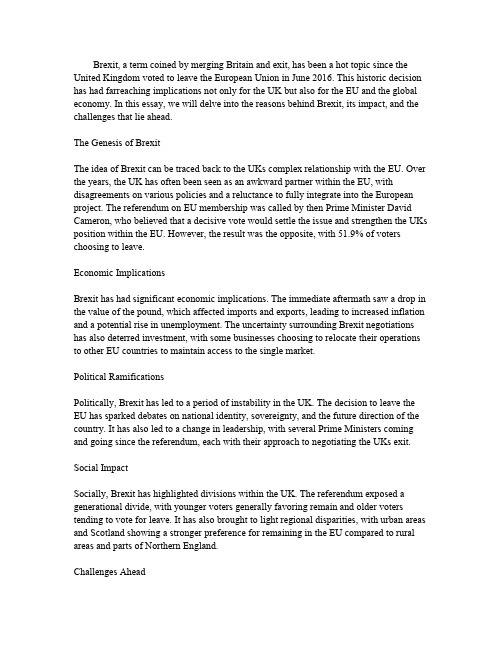
Brexit,a term coined by merging Britain and exit,has been a hot topic since the United Kingdom voted to leave the European Union in June2016.This historic decision has had farreaching implications not only for the UK but also for the EU and the global economy.In this essay,we will delve into the reasons behind Brexit,its impact,and the challenges that lie ahead.The Genesis of BrexitThe idea of Brexit can be traced back to the UKs complex relationship with the EU.Over the years,the UK has often been seen as an awkward partner within the EU,with disagreements on various policies and a reluctance to fully integrate into the European project.The referendum on EU membership was called by then Prime Minister David Cameron,who believed that a decisive vote would settle the issue and strengthen the UKs position within the EU.However,the result was the opposite,with51.9%of voters choosing to leave.Economic ImplicationsBrexit has had significant economic implications.The immediate aftermath saw a drop in the value of the pound,which affected imports and exports,leading to increased inflation and a potential rise in unemployment.The uncertainty surrounding Brexit negotiations has also deterred investment,with some businesses choosing to relocate their operations to other EU countries to maintain access to the single market.Political RamificationsPolitically,Brexit has led to a period of instability in the UK.The decision to leave the EU has sparked debates on national identity,sovereignty,and the future direction of the country.It has also led to a change in leadership,with several Prime Ministers coming and going since the referendum,each with their approach to negotiating the UKs exit.Social ImpactSocially,Brexit has highlighted divisions within the UK.The referendum exposed a generational divide,with younger voters generally favoring remain and older voters tending to vote for leave.It has also brought to light regional disparities,with urban areas and Scotland showing a stronger preference for remaining in the EU compared to rural areas and parts of Northern England.Challenges AheadThe road ahead is fraught with challenges.The UK must negotiate new trade deals, redefine its immigration policies,and determine its role on the global stage.The Northern Ireland border issue remains a contentious point,with the potential for disrupting the peace process established by the Good Friday Agreement.ConclusionBrexit is a complex and multifaceted issue that has reshaped the UKs relationship with the EU and the world.The decision to leave has sparked a period of introspection and change,with the full implications yet to be fully understood.As the UK navigates its postBrexit future,it will be crucial to address the economic,political,and social challenges that have arisen,ensuring that the country moves forward in a way that benefits all its citizens.。
英国脱欧影响英文论文

英国脱欧影响英⽂论⽂How the Brexit affects youName: Li ModanNumber:130440324School: School of applied EnglishClass:3Brexit is an abbreviation of "British exit", which refers to the June 23, 2016 referendum by British voters to exit the European Union.The referendum roiled British markets, including currencies, causing the British pound to fall to its lowest level in decades. Prime Minister David Cameron, who supported the UK remaining in the EU announced he would step down in October.But besides the effects for UK itself, how would the Brexit affects you must be the thing you are being concern about. My paper will analyze every possible effects may be caused for each part of the world.1. Mainland of ChinaFor Chinese government, UK left the European Union will affects Chinese economics. And as the only one EU member states who appealed to give China market economic status,the Brexit must will affects the relationships between China and Europe in a long term. For now, the European Union is the biggest trade partner o f China. What’s more, China and the European Union is having talks toward free trade, investment agreement and so on. And within the union,UK always supported and pushed the process of the liberation of Sino-EU trade with positive attitudes. For all those reasons, UK left the European Union will causes the influence that old decisions toward the union will be greatly reduced, and the process of talks between China and European Union mentioned before will going slow in a short term.2.Taiwan, ChinaSince January 1st, 2011, Taiwan passport holder can entrance European Union countries for short term stay without visa. On the other hand, UK and Ireland had already gave Taiwan the permission of visa-free. So that, although UK left European Union, the visa-free t reat won’t be canceled. For Taiwan consumers, if British pounds fall because of the Brexit, studying abroad and travel will become much more cost-effective and it will be more easy to busy British name brand products. As for economy, according to Washington News, large Taiwan enterprises who mainly export may benefit because of the falling exchange rate. The only one aspects under big attack is the Free Trade Agreement. Taiwan has to start over again on the FTA with UK. Because in October 2015, European Union mentioned that it will start the talks about bilateral investment treaty, and Taiwan needs to start a new talk with UK itself separately.3.HongKong, ChinaExperts think Brexit won’t affect HonKong a lot, but there’s indirect impact caused by it whic h is within the controllable zone. Now the UK left European Union, but HongKong still has two years as transitional period. But how to rearrange the Free Trade Agreement with UK during its EU member period can vary greatly.4.MacaoOn account of EU member states can use the freedom of movement right, Macanese who have the Portuguese passport can go to study, work or live in UK for anytime without applying for visa as long as there’s a school or company where they can be received. Now since UK left EU, the freedom of movement right for Macanese may be reduced, and they need to apply fora visa since now.5.the United StatesFor all the time, the US has very close ally relationships with UK and they stay at the same side firmly on many international issues. Even more important, the US usually through UK to achieve the goal of impact the European Union. Since UK left the union, position of UK in American’s European strategy may be lower much. And the US have lost the most important partner align with European Union.Meantime, Brexit is considered a reason of EU’s breakdown. Europe’s disunity will make it be hard to impose economic sanctions to Russia. The cost of allies management system and competitions with hostile nations will increase a lot for the United States.6.GemanyAbout economy, British is the fifth great trade partner of Germany. The budget UK offered to European Union in 2014 was 71 billion Euro, so now the most part of this funds gap will become Germany’s responsibility. About the politics, Germany treats UK as its most important political ally. Now since UK left the European Union, Germany is seemed to be a too big, to difficult to control the whole picture country in other EU member states’ eyes. Small countries in EU will increase their awareness of safety towards Germany. Most German think they are European first, then German. After UK left EU, now there’re one third people expressed they want to leave EU if possible.7.FranceAccording to the poll in April, 58% French wanted UK stay in EU, 40% wanted UK leave. But according to a article by Agence France Press, not as conditions of how other EU member wanted UK stay, France’s public opinion has much more people supported UK to leave which also showed that there’s more people in France sta rted to doubt about European integration. President of French said that UK’s leave will causes knock-on effects include market, financial trade, economics of both UK and France ,diplomacy development and so on, and even more, situation of migrants handling will become a problem.8.European UnionInstitutions and inventions like issue of Euro and Schengen Agreement are the symbol of European integration, but now they’ve been shocked and challenged by the Eurozone Crisis and refugee wave. Now it is hard to quantize how many other European Union members will follow UK’s step to leave the union. But except leave EU, whom be encouraged are Scotland who wants to leave the British Commonwealth and Catalonia who wants to leave Spain. EU in this situation, although it’s now fall apart, it is very hard for it to play important role in International arena anymore. Brexit is not a thing only related to a specific country, it has massive effects to the worlds. But that’s just the world, it always be changing. What not change at all is change itself. So for us, what need to do is learn how to stay with the new world circumstances.。
Brexit 英国脱欧后怎么办 ted演讲原文
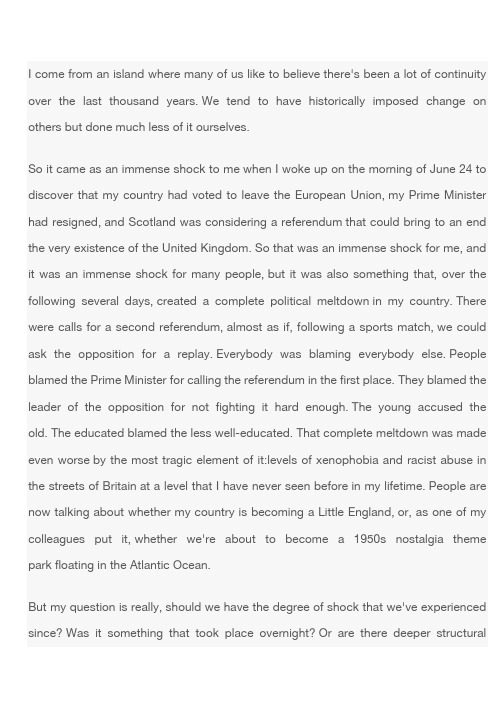
I come from an island where many of us like to believe there's been a lot of continuity over the last thousand years. We tend to have historically imposed change on others but done much less of it ourselves.So it came as an immense shock to me when I woke up on the morning of June 24 to discover that my country had voted to leave the European Union, my Prime Minister had resigned, and Scotland was considering a referendum that could bring to an end the very existence of the United Kingdom. So that was an immense shock for me, and it was an immense shock for many people, but it was also something that, over the following several days, created a complete political meltdown in my country. There were calls for a second referendum, almost as if, following a sports match, we could ask the opposition for a replay. Everybody was blaming everybody else. People blamed the Prime Minister for calling the referendum in the first place. They blamed the leader of the opposition for not fighting it hard enough. The young accused the old. The educated blamed the less well-educated. That complete meltdown was made even worse by the most tragic element of it:levels of xenophobia and racist abuse in the streets of Britain at a level that I have never seen before in my lifetime. People are now talking about whether my country is becoming a Little England, or, as one of my colleagues put it, whether we're about to become a 1950s nostalgia theme park floating in the Atlantic Ocean.But my question is really, should we have the degree of shock that we've experienced since? Was it something that took place overnight? Or are there deeper structuralfactors that have led us to where we are today? So I want to take a step back and ask two very basic questions. First, what does Brexit represent, not just for my country, but for all of us around the world? And second, what can we do about it? How should we all respond?So first, what does Brexit represent? Hindsight is a wonderful thing. Brexit teaches us many things about our society and about societies around the world. It highlights in ways that we seem embarrassingly unaware of how divided our societies are. The vote split along lines of age, education, class and geography. Young people didn't turn out to vote in great numbers, but those that did wanted to remain. Older people really wanted to leave the European Union. Geographically, it was London and Scotland that most strongly committedto being part of the European Union, while in other parts of the country there was very strong ambivalence. Those divisions are things we really need to recognize and take seriously. But more profoundly, the vote teaches us something about the nature of politics today. Contemporary politics is no longer just about right and left. It's no longer just about tax and spend. It's about globalization. The fault line of contemporary politics is between those that embrace globalization and those that fear globalization.If we look at why those who wanted to leave -- we call them "Leavers," as opposed to "Remainers" -- we see two factors in the opinion polls that really mattered. The first was immigration, and the second sovereignty, and these represent a desire for people to take back control of their own lives and the feeling that they are unrepresented bypoliticians.But those ideas are ones that signify fear and alienation. They represent a retreat back towards nationalism and borders in ways that many of us would reject. What I want to suggest is the picture is more complicated than that, that liberal internationalists, like myself, and I firmly include myself in that picture, need to write ourselves back into the picture in order to understand how we've got to where we are today. When we look at the voting patterns across the United Kingdom, we can visibly see the divisions. The blue areas show Remain and the red areas Leave. When I looked at this, what personally struck me was the very little time in my life I've actually spent in many of the red areas. I suddenly realized that, looking at the top 50 areas in the UK that have the strongest Leave vote, I've spent a combined total of four days of my life in those areas. In some of those places, I didn't even know the names of the voting districts. It was a real shock to me, and it suggested that people like me who think of ourselves as inclusive, open and tolerant,perhaps don't know our own countries and societies nearly as well as we like to believe.And the challenge that comes from that is we need to find a new way to narrate globalization to those people, to recognize that for those people who have not necessarily been to university, who haven't necessarily grown up with the Internet, that don't get opportunities to travel, they may be unpersuaded by the narrative that we find persuasive in our often liberal bubbles.It means that we need to reach out more broadly and understand. In the Leave vote, a minority have peddled the politics of fear and hatred, creating lies and mistrust around,for instance, the idea that the vote on Europe could reduce the number of refugees and asylum-seekers coming to Europe, when the vote on leaving had nothing to do with immigration from outside the European Union. But for a significant majority of the Leave voters the concern was disillusionment with the political establishment. This was a protest vote for many, a sense that nobody represented them, that they couldn't find a political party that spoke for them, and so they rejected that political establishment.This replicates around Europe and much of the liberal democratic world. We see it with the rise in popularity of Donald Trump in the United States, with the growing nationalism of Viktor Orbán in Hungary, with the increase in popularity of Marine Le Pen in France. The specter of Brexit is in all of our societies.So the question I think we need to ask is my second question, which is how should we collectively respond? For all of us who care about creating liberal, open, tolerant societies,we urgently need a new vision, a vision of a more tolerant, inclusive globalization, one that brings people with us rather than leaving them behind.That vision of globalization is one that has to start by a recognition of the positive benefits of globalization. The consensus amongst economists is that free trade, the movement of capital, the movement of people across borders benefit everyone on aggregate. The consensus amongst international relations scholars is that globalization brings interdependence, which brings cooperation and peace. But globalization also has redistributive effects. It creates winners and losers. To take the example ofmigration, we know that immigration is a net positive for the economy as a whole under almost all circumstances. But we also have to be very aware that there are redistributive consequences, that importantly, low-skilled immigration can lead to a reduction in wages for the most impoverished in our societies and also put pressure on house prices. That doesn't detract from the fact that it's positive, but it means more people have to share in those benefits and recognize them.In 2002, the former Secretary-General of the United Nations, Kofi Annan, gave a speech at Yale University, and that speech was on the topic of inclusive globalization. That was the speech in which he coined that term. And he said, and I paraphrase, "The glass house of globalization has to be open to all if it is to remain secure. Bigotry and ignorance are the ugly face of exclusionary and antagonistic globalization."That idea of inclusive globalization was briefly revived in 2008 in a conference on progressive governance involving many of the leaders of European countries. But amid austerity and the financial crisis of 2008, the concept disappeared almost without a trace.Globalization has been taken to support a neoliberal agenda. It's perceived to be part of an elite agenda rather than something that benefits all. And it needs to be reclaimed on a far more inclusive basis than it is today.So the question is, how can we achieve that goal? How can we balance on the one hand addressing fear and alienation while on the other hand refusing vehemently togive in to xenophobia and nationalism? That is the question for all of us. And I think, as a social scientist, that social science offers some places to start. Our transformation has to be about both ideas and about material change, and I want to give you four ideas as a starting point.The first relates to the idea of civic education. What stands out from Brexit is the gap between public perception and empirical reality. It's been suggested that we've moved to a postfactual society, where evidence and truth no longer matter, and lies have equal status to the clarity of evidence. So how can we --How can we rebuild respect for truth and evidence into our liberal democracies? It has to begin with education, but it has to start with the recognition that there are huge gaps.In 2014, the pollster Ipsos MORI published a survey on attitudes to immigration, and it showed that as numbers of immigrants increase, so public concern with immigration also increases, although it obviously didn't unpack causality, because this could equally be to do not so much with numbers but the political and media narrative around it. But the same survey also revealed huge public misinformation and misunderstanding about the nature of immigration. For example, in these attitudes in the United Kingdom, the public believed that levels of asylum were a greater proportion of immigration than they were, but they also believed the levels of educational migration were far lower as a proportion of overall migration than theyactually are. So we have to address this misinformation, the gap between perception and reality on key aspects of globalization. And that can't just be something that's left to our schools, although that's important to begin at an early age. It has to be about lifelong civic participation and public engagement that we all encourage as societies.The second thing that I think is an opportunity is the idea to encourage more interaction across diverse communities.One of the things that stands out for me very strikingly, looking at immigration attitudes in the United Kingdom, is that ironically, the regions of my country that are the most tolerant of immigrants have the highest numbers of immigrants. So for instance, London and the Southeast have the highest numbers of immigrants, and they are also by far the most tolerant areas. It's those areas of the country that have the lowest levels of immigration that actually are the most exclusionary and intolerant towards migrants.So we need to encourage exchange programs. We need to ensure that older generations who maybe can't travel get access to the Internet. We need to encourage, even on a local and national level, more movement, more participation, more interaction with people who we don't know and whose views we might not necessarily agree with.The third thing that I think is crucial, though, and this is really fundamental, is we have to ensure that everybody shares in the benefits of globalization. This illustration fromthe Financial Times post-Brexit is really striking. It shows tragically that those people who voted to leave the European Union were those who actually benefited the most materiallyfrom trade with the European Union. But the problem is that those people in those areasdidn't perceive themselves to be beneficiaries. They didn't believe that they were actually getting access to material benefits of increased trade and increased mobility around the world.I work on questions predominantly to do with refugees, and one of the ideas I spent a lot of my time preaching, mainly to developing countries around the world, is that in order to encourage the integration of refugees, we can't just benefit the refugee populations, we also have to address the concerns of the host communities in local areas. But in looking at that, one of the policy prescriptions is that we have to provide disproportionately better education facilities, health facilities, access to social services in those regions of high immigration to address the concerns of those local populations. But while we encourage that around the developing world, we don't take those lessons home and incorporate them in our own societies.Furthermore, if we're going to really take seriously the need to ensure people share in the economic benefits, our businesses and corporations need a model of globalization that recognizes that they, too, have to take people with them.The fourth and final idea I want to put forward is an idea that we need more responsible politics. There's very little social science evidence that compares attitudes onglobalization.But from the surveys that do exist, what we can see is there's huge variation across different countries and time periods in those countries for attitudes and tolerance of questions like migration and mobility on the one hand and free trade on the other. But one hypothesis that I think emerges from a cursory look at that data is the idea that polarized societies are far less tolerant of globalization. It's the societies like Sweden in the past, like Canada today, where there is a centrist politics, where right and left work together, that we encourage supportive attitudes towards globalization. And what we see around the world today is a tragic polarization, a failure to have dialogue between the extremes in politics,and a gap in terms of that liberal center ground that can encourage communication and a shared understanding. We might not achieve that today, but at the very least we have to call upon our politicians and our media to drop a language of fear and be far more tolerant of one another.These ideas are very tentative, and that's in part because this needs to be an inclusive and shared project.For those of us who believe that our identities are not mutually exclusive, we have to all work together to ensure that globalization takes everyone with us and doesn't leave people behind. Only then will we truly reconcile democracy and globalization.。
英国脱欧对欧洲经济的影响
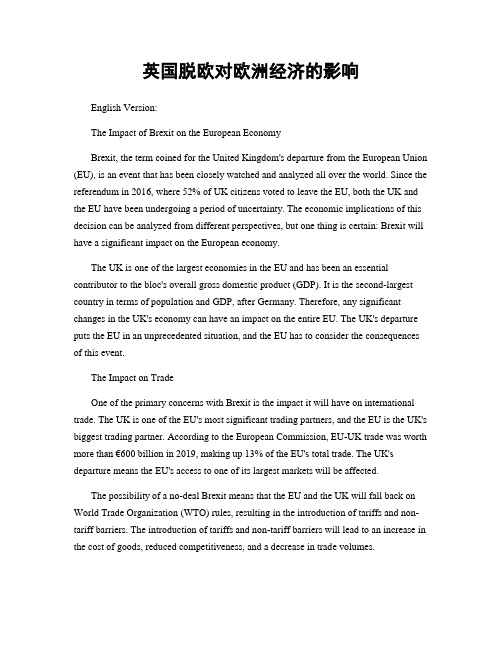
英国脱欧对欧洲经济的影响English Version:The Impact of Brexit on the European EconomyBrexit, the term coined for the United Kingdom's departure from the European Union (EU), is an event that has been closely watched and analyzed all over the world. Since the referendum in 2016, where 52% of UK citizens voted to leave the EU, both the UK and the EU have been undergoing a period of uncertainty. The economic implications of this decision can be analyzed from different perspectives, but one thing is certain: Brexit will have a significant impact on the European economy.The UK is one of the largest economies in the EU and has been an essential contributor to the bloc's overall gross domestic product (GDP). It is the second-largest country in terms of population and GDP, after Germany. Therefore, any significant changes in the UK's economy can have an impact on the entire EU. The UK's departure puts the EU in an unprecedented situation, and the EU has to consider the consequences of this event.The Impact on TradeOne of the primary concerns with Brexit is the impact it will have on international trade. The UK is one of the EU's most significant trading partners, and the EU is the UK's biggest trading partner. According to the European Commission, EU-UK trade was worth more than €600 billion in 2019, making up 13% of the EU's total trade. The UK's departure means the EU's access to one of its largest markets will be affected.The possibility of a no-deal Brexit means that the EU and the UK will fall back on World Trade Organization (WTO) rules, resulting in the introduction of tariffs and non-tariff barriers. The introduction of tariffs and non-tariff barriers will lead to an increase in the cost of goods, reduced competitiveness, and a decrease in trade volumes.The EU is already in a difficult position with the COVID-19 pandemic and the resultant economic slowdown. The introduction of tariffs and non-tariff barriers will further add to the stress, which can have negative impacts on the EU's economic growth.The Impact on Sectoral EconomiesBrexit is likely to have a disproportionate impact on certain industries in the EU. The automotive, food, and agriculture sectors are particularly vulnerable to the consequences of Brexit.In the automotive sector, the UK is one of the largest producers of cars in Europe, and a significant importer of cars and car parts from the EU. The introduction of tariffs and non-tariff barriers will lead to increased costs, making the UK's vehicle producers less competitive. This can lead to production cuts, job losses, and ultimately, a reduction in the sector's contribution to the economy.Similarly, the food and agriculture sector is heavily dependent on the UK. According to the European Commission, the UK is the EU's second-largest export destination for agri-food products. The introduction of tariffs and non-tariff barriers on agri-food products can lead to decreased competitiveness, job losses, and reduced contribution to the economy.The Impact on InvestmentBrexit is already having an impact on investment in the EU. Businesses are hesitant to invest in the EU due to the uncertainty surrounding Brexit. The UK's departure from the EU can lead to a redistribution of investment and capital flows from the UK to other non-EU countries. This can lead to a reduction in the amount of investment that flows into the EU.The relocation of businesses from the UK to the EU will be costly, and this cost will be borne by businesses operating in the EU. This can lead to lower profitability and reduced competitiveness.ConclusionBrexit has far-reaching implications for the European economy. Though the exact impact cannot be foretold, it is likely that the EU's economy will be negatively impacted by the UK's departure. The impact on trade, sectoral economies, and investment will be felt keenly. The EU will need to be proactive in its response to these unpredictable times. It is too early to say how the UK's departure will ultimately affect the EU, but it is clear that both parties will need to work together to mitigate any negative consequences.。
2019各国年度词汇出炉

2019各国年度词汇出炉2019年已经过去,各国媒体和语言学专家纷纷公布了今年的年度词汇。
这些词汇,不仅仅反映了社会热点和年度事件,还展现了当年的社会、文化和语言特点。
下面就为大家介绍一下2019年各国的年度词汇。
在中国,今年的年度词汇是“开放”的“沟通”。
这个词表达了中国政府一直以来的改革和开放态度,也表明了中国希望与世界各国进行更加积极的交流与合作。
还有一些热门词汇,如“996”、“老铁”、“网红经济”等,这些词汇反映了中国年轻人的生活方式和社交模式。
在美国,年度词汇是“impeach”,这是指美国国会对总统提出弹劾的程序。
今年,美国国会对特朗普总统提出了弹劾调查,所以这个词成为了近期最热门的政治术语。
还有一些类似的词汇,如“quid pro quo”、“whistleblower”等也得到了广泛关注。
在日本,年度词汇是“令和”。
今年5月,新天皇即位,开启了一个新的时代——“令和时代”。
这个词代表了日本人对新时代的期待和祝愿,成为了今年最重要的词汇。
还有一些与环境和自然有关的词汇,如“台風”、“節電”等也备受瞩目。
在英国,年度词汇是“Brexit”。
这个词已经连续几年成为英国的年度词汇,反映了英国脱欧的关注度和影响力。
今年,英国脱欧进入了关键阶段,所以这个词成为了热门词汇。
还有一些与环境和气候有关的词汇,如“climate emergency”、“extinction rebellion”等也得到了广泛关注。
在德国,年度词汇是“klimanotstand”。
这个词指的是气候紧急状态,反映了全球气候变化问题的严重性和紧迫性。
今年,德国政府宣布了气候紧急状态,激发了人们对气候问题的关注和行动。
还有一些与移民和种族问题有关的词汇,如“Integrationstest”、“Heimat”等也备受瞩目。
